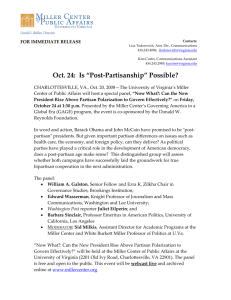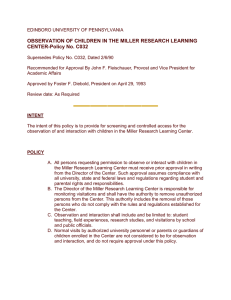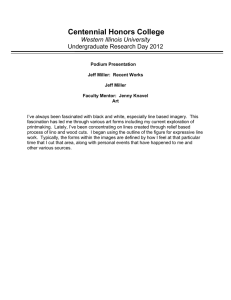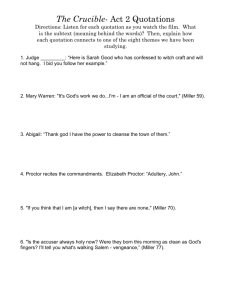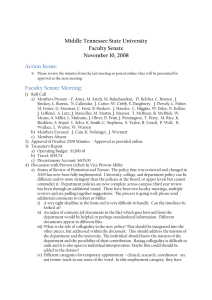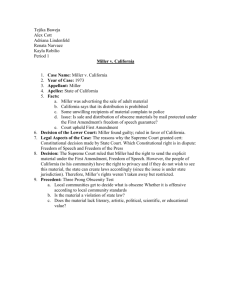Faculty Senate Academic Affairs Liaison Cope Conference Center
advertisement
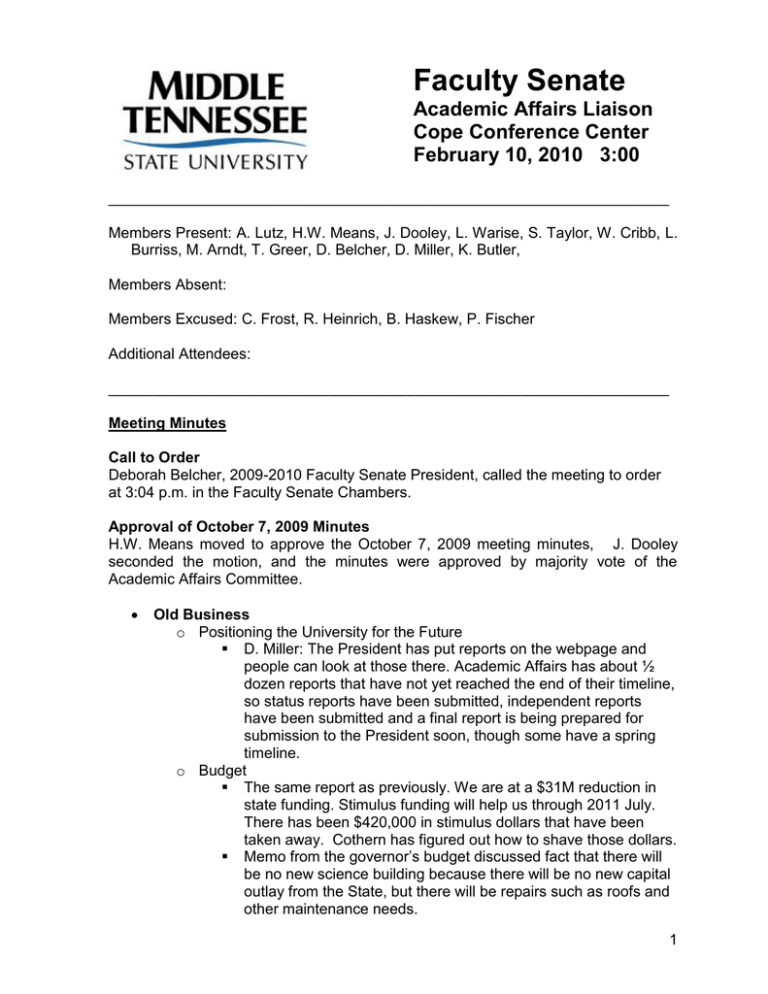
Faculty Senate Academic Affairs Liaison Cope Conference Center February 10, 2010 3:00 ___________________________________________________________________ Members Present: A. Lutz, H.W. Means, J. Dooley, L. Warise, S. Taylor, W. Cribb, L. Burriss, M. Arndt, T. Greer, D. Belcher, D. Miller, K. Butler, Members Absent: Members Excused: C. Frost, R. Heinrich, B. Haskew, P. Fischer Additional Attendees: ___________________________________________________________________ Meeting Minutes Call to Order Deborah Belcher, 2009-2010 Faculty Senate President, called the meeting to order at 3:04 p.m. in the Faculty Senate Chambers. Approval of October 7, 2009 Minutes H.W. Means moved to approve the October 7, 2009 meeting minutes, J. Dooley seconded the motion, and the minutes were approved by majority vote of the Academic Affairs Committee. Old Business o Positioning the University for the Future D. Miller: The President has put reports on the webpage and people can look at those there. Academic Affairs has about ½ dozen reports that have not yet reached the end of their timeline, so status reports have been submitted, independent reports have been submitted and a final report is being prepared for submission to the President soon, though some have a spring timeline. o Budget The same report as previously. We are at a $31M reduction in state funding. Stimulus funding will help us through 2011 July. There has been $420,000 in stimulus dollars that have been taken away. Cothern has figured out how to shave those dollars. Memo from the governor’s budget discussed fact that there will be no new science building because there will be no new capital outlay from the State, but there will be repairs such as roofs and other maintenance needs. 1 Proposed 3% 1 time bonus to faculty salaries if tax legislation passes. There may be another $3M in cuts down the line. A. Lutz: If there is an additional cut, will the number of authorized hires be cut? D. Miller: We have not considered that yet because the cut is still just a projection. We are moving forward with all active searches. New Business o Buy Out Program 58 participants came from Academic Affairs and 38 were faculty Academic Affairs has an extended timeline to say how it will meet the $6.7M cut that needs to be made. The buyout gave Academic Affairs about $3.7 from the buyout. There were 36 positions empty from last year, of that 17 or 18 vacant lines were offered up ($ from those lines was given back to University). Some were filled with full-time temps. But that money came from stimulus dollars, not state dollars. The buyouts in the other divisions helped them meet their fair share. Academic Affairs still has to make its numbers for the cut. Goal is to protect people as much as possible. The vacant faculty and classified positions, along with NIAs were cut from 16 to 8, resulting in Academic Affairs meeting its additional $3M in obligations without affecting people who are currently in lines. Problem is that this does not consider positions that need to be refilled. o There are a number of GTAs (funded through Academic Affairs) who are SACS qualified to teach who are not in the classroom. We will get these people in the classroom. Perhaps this could help support some positions. o It was recommended that there be positive PR with adjuncts and GTAs to counter potential negative perceptions in the public. o Any graduate assistant position funded through AA is there as a GTA, if that person is not in the classroom, then that needs to be justified. Graduate assistants may also be used to prepare Institutional Effectiveness data. One department lost 4 people in the buyout. This is a significant blow to that department. Academic Affairs will determine which of those lines need to be kept and filled as tenure track lines. o Those lines may still need full-time temps for some positions. o First look inward, at the college, to determine if department to department that position needs to be shifted. Next, look college to college to determine whether there will be shifts in the lines from one college to another. o D. Miller will look at percentage of people taking the buyout, and look more favorably to keep positions in colleges were a higher percentage took the buyout. But there are many pieces of the 2 o o o o puzzle to be considered. One thing to consider is the staffing formula. It will be difficult for a department that is 6 faculty overstaffed to keep a position. It will be easier for a department that is understaffed to keep a position. Also considering number of students and number of majors. Not all deans have reports in to D. Miller, next Wednesday is their deadline. J. Dooley: How are these considerations made in light of the restructuring? D. Miller: One of the guiding principles was to not have a mega college. The number of tenure track faculty was not the determining factor in restructuring. D. Miller: Any faculty losses from means other than buyout, same considerations will be made. An adjunct pool will be created. Advertise in Tennessean, DNJ etc. To encourage people to apply to be an adjunct or full-time temp. Get applications, letters of reference. Also checking into the cost of background checks on adjuncts. This seems like a necessity in light of the fact that we are putting these people in front of our students. Is there concern about how the public will react to MTSU creating an adjunct pool? D. Miller: This is being prepared, and the same criteria for quality will be used that has been used in the past. This will make sure we are prepared before classes start in the Fall. Won’t this result in an impact on the quality of MTSU? D. Miller: As a faculty member she is concerned about this. As resources improve, we will see the benefits. This has been proven by Dr. McPhee in the past, and we can expect that in the future. Enrollment this spring was up 5% over last spring, so we are continuing to grow. We have to cover classes somehow. D. Miller: Tenured faculty need to step up to the plate and assist adjuncts and temps with the teaching process to help make this work. Will the current number of adjuncts be a consideration in the decision making process? If there are a significant number of adjuncts/temps, the Provost will take that into consideration in the decision of 3 whether to keep a line or give a line away. D. Miller is just now looking at graduation rates, accreditation issues and more. Are there faculty teaching 2-3 courses who could take on an additional course during this period of time rather than hiring an adjunct? This should be rotated among more senior, tenured faculty. This discussion should probably take place. Concern of faculty is that THEC will make faculty teach an overload forever. We’re spending around $4,200 for two adjunct positions to teach very small sections at the 1000 level that did not need to be taught. We all need to make fiscal decisions. We need many tools in our arsenal when these cuts come down the pipe. What is happening with the doctoral programs and the high cost related to those? What is happening with growing programs? D. Miller: Supports President’s move to get Doctoral programs, these are crucial for Carnegie Status and without these there would be an impact on salaries, funding and marketing analysis. The new PhD programs have opportunities for external funding. There is hope that the new science PhDs will become self-supporting. There is still a desire for a PhD in Education on this campus. Teacher education is our history and we want to move forward with teacher education. Rotary club asked about work with International Exchanges and Confucius Institute. A community member asked, “What is the value of starting a new program?” D. Miller believes in the value of internationalizing our campus. We don’t have the resources as a University, and most of our students do not have the resources, so 4 bringing International students here will expose our students to other cultures and help them become more worldly. This will make them more competitive for future jobs. We are hiring a new Vice Provost into International Affairs (filling Anne Sloan’s line). McPhee has said that we will continue to invest in these programs to move our University forward. Questions and Discussion o Tenure and Promotion Sometimes a department recommends a person for tenure but not promotion. Will these applications no longer be considered? o The President talked to D. Miller about our T&P policies. Our current policy says that T&P to Associate Professor are usually/generally linked though not technically linked. So our policy allows for separation. The president is uncomfortable with that and thought that possibility had been eliminated. But it is still there. It is anticipated in the future that those will necessarily be linked, but there will be a discussion with the campus first. There are few that go up for only one or the other, so that review was done and it was reasonable to give one or the other. o There will be a summer retreat with Deans and Department Chairs to identify violations of policy, such as “anything in press” cannot be counted, but those were, in fact, counted at the college level. o TBR, University, College and Department policies are being reviewed by Dr. Miller. o She notes that a department can have higher standards than a college, a college can have higher standards that the University, and the University can have higher standards than the TBR, but none of those can have lower standards than the TBR. o Director of General Education, Bill: In terms of getting adjuncts into the classroom, these people that are approved for SACS, we look at their letters, and those letters need to support their ability to teach the topic. In many ways, MTSU is in better shape with regard to the adjunct pool than other colleges across the state. MTSU tries to get the very best and makes an academic judgment before placing these people in the classroom. Adjournment D. Belcher adjourned the meeting at 4:30 p.m. Respectfully submitted, Stephanie Taylor 5 2009-2010 Faculty Senate Recording Secretary Edited: Gay L. Johnson, 2/19/10 6
